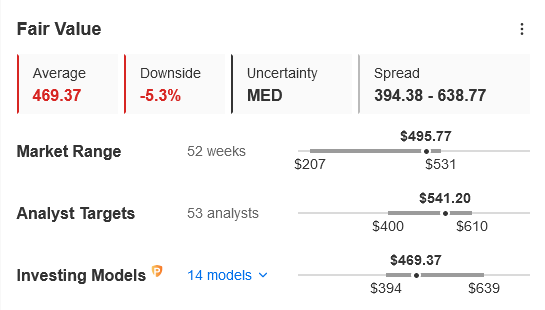Investing.com - As Meta Platforms Inc (NASDAQ:META) gears up to release its first-quarter earnings report this Wednesday, market watchers are keenly interested. The parent company of Facebook has seen its stock surge nearly 40% this year and 130% over the past 12 months, pushing its market capitalization above $1 trillion again. However, recent market turbulence has put Meta's stock under pressure, making the upcoming earnings results a crucial test for the company's swift recovery narrative.
Analysts forecast that Meta will report sales of $36.14 billion, marking a 26% increase from the same period in 2023, and earnings per share are expected to rise by 95% to $4.32. A key factor to watch will be Meta's spending, as the company continues to make significant investments in AI and its metaverse-focused Reality Labs division. The company's recent unveiling of its new large language model, Llama, and upgrades to its Meta.ai chatbot underscore its ongoing commitment to generative AI.
However, these advancements come with substantial costs. Meta is redesigning its data centers, developing custom computing chips, and buying hundreds of thousands of chips from Nvidia to support its AI ambitions. In February, Meta increased the upper end of its capital expenditures guidance for 2024 to between $30 billion and $37 billion. Any further increase in spending expectations could raise concerns, unless Meta continues to keep its revenue growth on track.
A key driver of Meta's revenue is its advertising business, which contributed 97% of the company's revenue in the fourth quarter. Analysts predict that ad sales will drive 98% of revenue in the first quarter, with advertising sales expected to grow 26% to $35.4 billion.
Analysts from Wells Fargo & Company (NYSE:WFC), RBC, Goldman Sachs Group Inc (NYSE:GS), Bank of America Corp (NYSE:BAC), and JPMorgan Chase & Co (NYSE:JPM) have all expressed optimism about Meta's ad-led strength in Q1, propelled by a robust e-commerce environment. They also highlight the potential of Instagram Reels and AI-driven ad improvements as significant growth contributors in the future.
However, these analysts also caution that growth prospects might cool after the first quarter, and Meta needs to identify new product-cycle catalysts to maintain ad momentum. The potential impact of China's economic slowdown on ad spending and the need for new product innovations to support the next phase of Meta's growth also remain to be addressed. Despite these concerns, the general consensus is that Meta remains a strong contender in the digital advertising space and is well-positioned for long-term growth.

